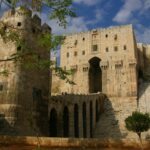Current Fellows’ Research
The Afterlives of Urban Muslim Asia
Dr Paul Anderson
 To what extent do great urban centres in Muslim Asia continue to be a powerful source of identity in diaspora, and what accounts for this? This research project, funded by the AHRC and led by the University of Sussex with Dr Paul Anderson as Co-Investigator at Cambridge, explores the legacies of urban life in four cities: Kabul, Herat, Bukhara and Aleppo. It will explore the modes of urban life that displaced populations sustain and transmit in the diaspora, focusing particularly on cosmopolitan habits of maintaining inter-ethnic and inter-religious relationships.
To what extent do great urban centres in Muslim Asia continue to be a powerful source of identity in diaspora, and what accounts for this? This research project, funded by the AHRC and led by the University of Sussex with Dr Paul Anderson as Co-Investigator at Cambridge, explores the legacies of urban life in four cities: Kabul, Herat, Bukhara and Aleppo. It will explore the modes of urban life that displaced populations sustain and transmit in the diaspora, focusing particularly on cosmopolitan habits of maintaining inter-ethnic and inter-religious relationships.
Rethinking Transnational Islamic Movements within & across the Middle East & Europe
Dr Iman Dawood
Contributing to an Islamic religious revival – a resurgence in the practice and public expression of Islam – since the 1920s, Islamic movements have worked to shape the way that many Muslims around the world relate to Islam and/or partake in Islamic activism. Yet these global movements and their exponents in Europe and the so-called Middle East and North Africa (MENA) region are not static. Instead, they have evolved in significant ways across these geographical contexts. Dr Iman Dawood is investigating how these movements are changing and is organising a symposium on March 6th 2024 to discuss the changes with a wide range of academics, activists and policymakers from Europe and the MENA region.
Green(ing) British Muslims: understanding and leveraging environmental action
Dr Davide Pettinato
Scaling up environmental action among British Muslims is essential to ensure that the UK’s green transition is successful, fair and inclusive: successful, because British Muslims are growing seven times faster than the general population; fair and inclusive, because British Muslims represent the largest and one of the most disadvantaged minority groups in the UK. Dr Davide Pettinato’s research aims to establish fundamental understandings of existing and emerging forms of environmental action among British Muslims, so that opportunities and challenges for scale-up can be identified.

